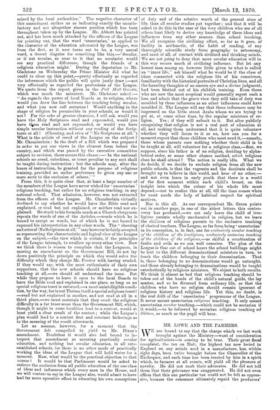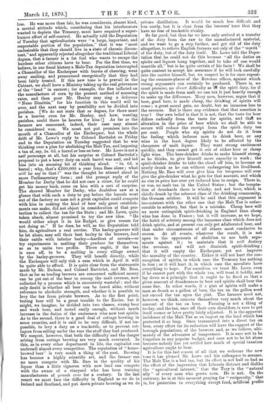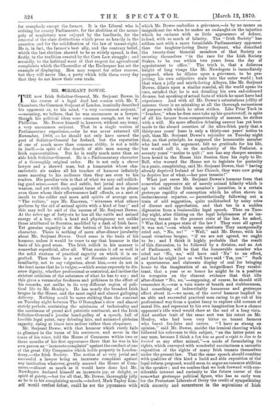MR. LOWE AND THE FARM - FIRS.
WE are bound to say that the charge which we last week brought against the Ministry—want of consideration for agriculturists—is ceasing to be true. Their great fiscal complaint, the tax on Malt, the highest tax now levied in England on any article used in a manufacture, has, within eight days, been twice brought before the Chancellor of the Exchequer, and each time has been treated by him in a spirit which, to farmers at all events, will yield all the pleasure of novelty. He did not snub their advocates. He did not tell them that their grievance was exaggerated. He did not even affirm that this one particular tax could not be felt as oppres- sive, because the consumer ultimately repaid the producers' loss. He was more than fair, he was considerate, almost kind, a mental attitude which, considering that his interlocutors wanted to deplete the Treasury, mast have required a super- human effort of self-control. He actually told the Deputation of Tuesday that agriculturists were "a large, important, and respectable portion of the population," that it was "most undesirable that they should live in a state of chronic discon- tent," and apparently rejected altogether the traditional Liberal dogma, that a farmer is a fat fool who wants to escape the burdens other citizens have to bear. For the first time, we believe, in our fiscal history a Malt-Tax deputation interrupted a Chancellor of the Exchequer with bursts of cheering, went away smiling, and pronounced energetically that they had been fairly treated. If this new tone is to prevail in the Cabinet, we shall have a, Ministry taking up the real grievances of the "land " in earnest ; for example, the fine inflicted on the manufacture of corn by the present method of assessing rates, and then poor Mr. Henley may sing a dolorous "Nun° Dimittis," for his function in this world will be over, and the next may by possibility not be divided into parishes. [We do not state that as dogma, for there must be a heaven even for Mr. Henley, and how, wanting parishes, could there be heaven for him ?] As far as the farmers are concerned, indeed, their case may almost be considered won. We must not put promises into the mouth of a Chancellor of the Exchequer, but the whole drift of Mr. Lowe's reply to Colonel Barttelot on Friday and to the Deputation on Tuesday suggested that he was thinking over a plan for abolishing the Malt Tax, and imposing a tax of, say, 5s. 6d. a barrel or less on beer. Mr. Lowe is not a naïf personage at all, but his surprise at Colonel Barttelot's proposal to put a heavy duty on each barrel was nail, and led him into an amusing bit of thinking aloud. " 5s. 6d. a barrel ; why, that's £200,000 a year from Bass alone ; what, will he say to that ?" was the thought he uttered aloud in more Parliamentary form ; and the prompt reply of the Member for Derby that he did not care a straw, for he could get his money back, came on him with a sort of surprise. The shrewd Member for Derby, who doubtless saw at a glance that with such a duty to pay before the barrels went out of the factory no man not a great capitalist could compete with him in making the kind of beer only great establish- ments can make, did not object in consideration of that pro- tection to collect the tax for the State ; and Mr. Lowe, quite taken aback, almost promised to try the new idea. "He would either adopt it in his Budget, or give reason for not doing so." If he does, he will, as the Deputation told him, do agriculture a real service. The barley-growers will be let alone, may sell their best barley to the brewers, feed their cattle with inferior barley—hardiest of cereals—or try experiments in malting their produce for themselves, so as to unite two profits. There ought, if the tax is once off, to be a malting in every village owned by the barley-growers. They will benefit directly, while the Exchequer will only risk a sum which in April it will be quite able to afford. It is quite clear from the statements made by Mr. Dodson, and Colonel Barttelot, and Mr. Bass, that as far as trading brewers are concerned sufficient money can be got out of the beer to recoup the malt revenue, now collected by a process which is excessively wasteful ; and the only doubt is whether all beer can be taxed alike, without reference to alcoholic strength, and whether it is possible to levy the tax from private brewers. As to the first point, testing beer will be a great trouble to the Excise, but it might, we imagine, be divided into two classes, strong beer and weak beer, and tested easily enough, without much increase in the duties of the excisemen who now test spirits. As to the second, there is a good deal of cottage brewing in some counties, and it is said to be very difficult, if not im- possible, to levy a duty on a tea-kettle, or to prevent cot- tagers from selling under the rose the stuff they had produced. We suspect, however, that both the difficulty and the danger arising from cottage brewing are very much overrated. In this, as in every other department in life, the capitalist can undersell almost every competitor. The reputation of " home- brewed beer" is very much a thing of the past. Brewing has become a highly scientific art, and the farmer can no more compete with Mr. Bass in the quality of his liquor than a little vigneron with new land can compete with the owner of a vineyard who has been training manufacturers of grands crux for a century. In the last resort we must face the difficulty in England as we do in Ireland and Scotland, and put down private brewing as we do
private distillation. It would be much less difficult and less costly, but it is clear from the brewers' tone that they have no fear of tea-kettle rivalry.
So far good, but thus far we have only arrived at a transfer of the duty from the raw to the manufactured material, and we want to go a step further, and get rid of the duty altogether, to relieve English farmers not only of the " worrit " of the duty, but of the duty itself. Mr. Lowe told the Depu- tation that he could not do this because " all the duties on spirits and liquors hung together, and to take off one would unsettle all," but is he quite certain of his facts ? We shall be quite content to accept his assurance if he will look carefully into the matter himself, but we suspect he is for once repeat- ing the common-places of the Revenue offices, against which strong arguments can certainly be produced. There is, we must premise, no direct difficulty as di the spirit duty, for if the spirit is made from malt we can tax it just heavily enough to make up the difference. Many men, however, argue that if beer, good beer, is made cheap, the drinking of spirits will cease ; a great moral gain, no doubt, but an immense loss to the revenue. But is there any evidence that that assertion is true ? Our own belief is that it is not, that the taste for beer differs radically from the taste for spirits, and that no alteration in the price of beer which we shall be able to- secure will reduce the receipt from the spirit duty ten per cent. People who sip spirits do not do it from the feeling which induces men to drink beer, or any wine in the least degree likely to be affected by the cheapness of malt liquor. They want strong excitement quickly, and they cannot get it out of either beer or cheap light wine. The beer-drinker drinks to make himself strong, as he thinks, to give himself more capacity to work ; the spirit-drinker drinks to take the cloud off him, to become as nearly drunk as he can without endangering his livelihood. Nothing Mr. Bass will ever give him for twopence will ever give the gin-drinker what he gets for that amount; and which no rise in price has ever yet induced him to resign. There is, or was, no malt tax in the United States ; but the tempta- tion of drunkards there is whisky, and not beer, which is chiefly drunk by the soberest class of the drinking community, the German settlers. It will be said that this argument is inconsistent with the other one that the Malt Tax is unfav- ourable to sobriety, but that is a mistake. Cheap beer will no more extinguish spirit-drinking in England than cheap wine has done in France ; but it will increase, as we hope, the habit of sobriety among the immense class which does not drink spirits, and at present can only get adulterated beer, and that under circumstances of all others most conducive to excess. At all events, whatever the result, it is not open to the opponents of abolition to use both argu- ments against it ; to maintain that it will destroy the revenue, and will not diminish spirit-drinking ; that it will empty the Exchequer, yet not improve the morality of the country. Either it will not hurt the con- sumption of spirits, in which case the Treasury has nothing to fear ; or it will hurt it, in which case the moralists have everything to hope. For ourselves, we trust Mr. Lowe, even if he cannot part with the whole tax, will treat it boldly, and lay down as a principle that it ought to be fixed so that a given amount of drunkenness in beer and spirits shall bear the same fine. In other words, if a pint of spirits will make a man as drunk as a gallon of beer, the tax on the gallon need not exceed the tax upon the pint. The farmers need not, however, we think, concern themselves very much about the amount of the tax on beer. Farming is not a thing of to-day, and the tax, once off their own shoulders, is sure to get itself sooner or later pretty fairly adjusted. It is the apparent incidence of the Malt Tax as an impost on the land which has protected it so long. Once transmuted into a direct tax on beer, every effort for its reduction will have the support of the borough populations, of the brewers, and, as we believe, ulti- mately of the advocates of temperance. It is sure not to be forgotten in any popular budget, and sure not to be let alone because nobody has yet settled how much of special taxation agriculture ought to bear.
It is for this last reason of all that we welcome the new tone it has pleased Mr. Lowe and his colleagues to assume. The Malt Tax is a bad tax, but its effect is not half so bad as the effect of the impression that Liberals distrust and dislike the " agricultural interest," that the Tory is the "natural ally " of every man who grows corn. He is not. On the contrary, he is at this moment praying for " reciprocity," that is, for protection to everything except food, artificial profits for everybody except the farmer. It is the Liberal who is striving for county Parliaments, for the abolition of the mono- poly of magistracy now enjoyed by the landlords, for the removal of the class distinctions which press so heavily in the counties, and for the solidification of the law of tenant-right. He is, in fact, the farmer's best ally, and the contrary belief, which the last election showed to be so widely spread, is due, firstly, to the tradition created by the Corn Law struggle ; and secondly, to the habitual want of that respect for agricultural complaints which the Chancellor of the Exchequer has set the example of displaying. Men may respect for other reasons, but they will never like, a party which tells them every day that they do not know their own trade.




































 Previous page
Previous page